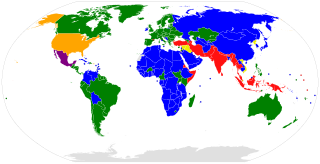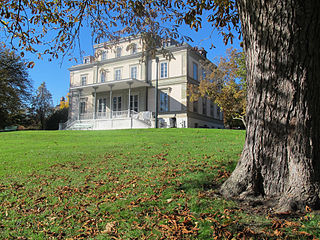Related Research Articles

The Geneva Convention relative to the Protection of Civilian Persons in Time of War, more commonly referred to as the Fourth Geneva Convention and abbreviated as GCIV, is one of the four treaties of the Geneva Conventions. It was adopted in August 1949, and came into force in October 1950. While the first three conventions dealt with combatants, the Fourth Geneva Convention was the first to deal with humanitarian protections for civilians in a war zone. There are currently 196 countries party to the 1949 Geneva Conventions, including this and the other three treaties.
International humanitarian law (IHL), also referred to as the laws of armed conflict, is the law that regulates the conduct of war. It is a branch of international law that seeks to limit the effects of armed conflict by protecting persons who are not participating in hostilities and by restricting and regulating the means and methods of warfare available to combatants.
The Manual on Effective Investigation and Documentation of Torture and Other Cruel, Inhuman or Degrading Treatment or Punishment, commonly known as the Istanbul Protocol, is the first set of international guidelines for documentation of torture and its consequences. It became an official United Nations document in 1999; the most recent revision was in June 2022.
The Working Group on Arbitrary Detention(WGAD) is a body of independent human rights experts that investigate cases of arbitrary arrest and detention. Arbitrary arrest and detention is the imprisonment or detainment of an individual, by a State, without respect for due process. These actions may be in violation of international human rights law.

The Geneva Conventions are international humanitarian laws consisting of four treaties and three additional protocols that establish international legal standards for humanitarian treatment in war. The singular term Geneva Convention colloquially denotes the agreements of 1949, negotiated in the aftermath of the Second World War (1939–1945), which updated the terms of the two 1929 treaties and added two new conventions. The Geneva Conventions extensively define the basic rights of wartime prisoners, civilians and military personnel; establish protections for the wounded and sick; and provide protections for the civilians in and around a war-zone.
Sondra Crosby is an American medical doctor and Professor of Medicine at Boston University, specializing in internal medicine. She is also a faculty member of the Health Law, Bioethics and Human Rights department at the Boston University School of Public Health.

Julian Paul Assange is an Australian editor, publisher, and activist who founded WikiLeaks in 2006. He came to international attention in 2010 after WikiLeaks published a series of leaks from Chelsea Manning, a former United States Army intelligence analyst: footage of a U.S. airstrike in Baghdad, U.S. military logs from the Afghanistan and Iraq wars, and U.S. diplomatic cables. Assange has won multiple awards for publishing and journalism.

The Algerian Red Crescent is an Algerian humanitarian volunteer organization founded in 1957. It has been recognized by the International Red Cross and Red Crescent Movement only since 1963.

Targeted Killing in International Law is a book about the legality of targeted killing, written by Nils Melzer. It was first published by Oxford University Press in May 2008. The book explores the history of targeted killing, as a government strategy by multiple countries including the United States, the United Kingdom, Israel, Switzerland and Germany; for both military and law enforcement purposes. Melzer argues that directly after the September 11 attacks in the United States, perceptions of the tactic became more positive.

Assange v Swedish Prosecution Authority were the set of legal proceedings in the United Kingdom concerning the requested extradition of Julian Assange to Sweden for a "preliminary investigation" into accusations of sexual offences allegedly made in August 2010. Assange left Sweden for the UK in 27 September 2010 and was arrested in his absence the same day. He was suspected of rape of a lesser degree, unlawful coercion and multiple cases of sexual molestation. In June 2012, Assange breached bail and sought refuge at Ecuador's Embassy in London and was granted asylum.
Medical neutrality refers to a principle of noninterference with medical services in times of armed conflict and civil unrest: physicians must be allowed to care for the sick and wounded, and soldiers must receive care regardless of their political affiliations; all parties must refrain from attacking and misusing medical facilities, transport, and personnel. Concepts comprising the principles of medical neutrality derive from international human rights law, medical ethics and humanitarian law. Medical neutrality may be thought of as a kind of social contract that obligates societies to protect medical personnel in both times of war and peace, and obligates medical personnel to treat all individuals regardless of religion, race, ethnicity, or political affiliation. Violations of medical neutrality constitute crimes outlined in the Geneva Conventions.
The term international framework of sexual violence refers to the collection of international legal instruments – such as treaties, conventions, protocols, case law, declarations, resolutions and recommendations – developed in the 20th and 21st century to address the problem of sexual violence. The framework seeks to establish and recognise the right all human beings to not experience sexual violence, to prevent sexual violence from being committed wherever possible, to punish perpetrators of sexual violence, and to provide care for victims of sexual violence. The standards set by this framework are intended to be adopted and implemented by governments around the world in order to protect their citizens against sexual violence.

The Geneva Academy of International Humanitarian Law and Human Rights is a postgraduate joint center located in Geneva, Switzerland. The faculty includes professors from both founding institutions and guest professors from major universities.

Swedish Doctors for Human Rights (SWEDHR) is a Sweden-based non-governmental organization (NGO) that previously researched and published opinion pieces on international affairs, and campaigned in support of doctors and anti-war activists persecuted or imprisoned on issues of civil liberties and freedom of expression. SWEDHR claimed to shed light on "health issues of war crimes & Human Rights abuses worldwide",[1] and it acknowledged to be an “alternative NGO” with regard to mainstream organizations. Ensuing, the views presented in its publications tended to differ from, or contradicted, those of Human Rights Watch, Amnesty International Sweden and other organizations. Up to mainly 2019, SWEDHR's primary focus has been the Julian Assange international case. During 2020 and onwards, the focus of the organization has been solely on issues around the Covid-19 pandemic.
The Minnesota Protocol on the Investigation of Potentially Unlawful Death (2016) is a set of international guidelines for the investigation of suspicious deaths, particularly those in which the responsibility of a State is suspected.

In 2012, while on bail, Julian Assange was granted political asylum in the Ecuadorian Embassy in London, where he sought to avoid extradition to Sweden, and what his supporters said was the possibility of subsequent extradition to the US. On 11 April 2019, Ecuador revoked his asylum, he was arrested for failing to appear in court, and carried out of the Embassy by members of the London Metropolitan Police. Following his arrest, he was charged and convicted, on 1 May 2019, of violating the Bail Act, and sentenced to fifty weeks in prison. While in prison the US revealed a previously sealed 2018 US indictment in which Assange was charged with conspiracy to commit computer intrusion related to his involvement with Chelsea Manning and WikiLeaks.

Robin Geiss is a German academic specializing in public international law. In 2021, he was appointed by United Nations Secretary-General António Guterres as Director of the United Nations Institute for Disarmament Research. Prior to this, Geiss held various academic appointments including as Swiss Chair of International Humanitarian Law at the Geneva Academy of International Humanitarian Law and Human Rights and Director of the Glasgow Centre for International Law and Security at the University of Glasgow.
The prohibition of torture is a peremptory norm in public international law—meaning that it is forbidden under all circumstances—as well as being forbidden by international treaties such as the United Nations Convention Against Torture.

Alice Jill Edwards is an Australian lawyer and scholar. She is the United Nations Special Rapporteur on Torture and Other Cruel, Inhuman or Degrading Treatment or Punishment.
Views on Julian Assange have been given by a number of public figures, including journalists, well-known whistleblowers, activists and world leaders. They range from laudatory statements to calls for his execution. Various journalists and free speech advocates have praised Assange for his work and dedication to free speech. Some former colleagues have criticised his work habits, editorial decisions and personality. After the 2016 US Presidential election, there was debate about his motives and his ties to Russia. After Assange's arrest in 2019, journalists and commenters debated whether Assange was a journalist. Assange has won multiple awards for journalism and publishing.
References
- ↑ OHCHR Nils Melzer Former Special Rapporteur on torture and other cruel, inhuman or degrading treatment or punishment (2016 - 2022)
- ↑ "Dr Nils Melzer". Speakers' Biographies. ACO - Allied Command Operations, NATO / OTAN. 2010. Retrieved 2010-10-22.
- ↑ "Introduction, Dr. Nils Melzer, Legal Adviser for the International Committee of the Red Cross, 'Targeted Killing in International Law'". The Graduate Institute. 16 October 2008. Retrieved 2010-10-22.
- ↑ "Nils Melzer", United Nations Human Rights: Office of the High Commissioner. Retrieved 23 April 2020.
- ↑ "Interpretive Guidance on the Notion of Direct Participation in Hostilities under International Humanitarian Law", International Committee of the Red Cross. 21 December 2010. Retrieved 23 April 2020.
- ↑ "International Humanitarian Law: A Comprehensive Introduction", International Committee of the Red Cross. 19 December 2019. Retrieved 23 April 2020.
- 1 2 "Will the right save Julian Assange?". The Spectator Australia. 2021-06-21. Retrieved 2023-11-01.
- ↑ "UN expert says "collective persecution" of Julian Assange must end now". OHCHR. 31 May 2019. Retrieved 1 June 2019.
- ↑ von Hein, Matthias (2020-12-28). "UN: US trying to 'criminalize investigative journalism'". Deutsche Welle . Retrieved 2023-02-26.
- ↑ "Julian Assange's treatment in prison putting his life at risk, UN rights expert warns". ABC News. AFP. 2 November 2019. Retrieved 13 November 2019.
- ↑ Davoise, Marie (2019-07-05). "Response to UN Special Rapporteur's op-ed on Julian Assange". Medium. Retrieved 2023-02-26.
- ↑ Nils Melzer (2019-07-08). "Dismantling the Swedish 'Rape'-Narrative against Julian Assange".
- ↑ Pieper, Dietmar (6 March 2020). "Opfer von WikiLeaks-Gründer Julian Assange kritisiert Uno-Folterexperten Nils Melzer". Der Spiegel. Archived from the original on 1 April 2020. Retrieved 2 April 2020.
- ↑ "Swedish prosecutor drops Julian Assange rape investigation".
- ↑ Pieper, Dietmar (6 March 2020). "Mutmaßliches Opfer von WikiLeaks-Gründer Julian Assange kritisiert Uno-Folterexperten Nils Melzer". Der Spiegel.
- ↑ Ryser, Daniel; Bachmann, Yves; Hawley, Charles (31 January 2020). "A murderous system is being created before our very eyes". Republik. Retrieved 2 April 2020.
- 1 2 von Hein, Matthias (20 April 2021). "The case of Julian Assange: Rule of law undermined – DW – 04/20/2021". dw.com. Retrieved 19 September 2023.
- ↑ "The trial of Julian Assange". www.aljazeera.com. Retrieved 5 May 2022.
- ↑ Oxford University Press, USA (2010), "Winner of the 2009 Paul Guggenheim Prize (Geneva Graduate Institute)", OUP USA Home, www.oup.com, archived from the original on 29 June 2011, retrieved 10 April 2016
- ↑ Melzer, Nils (29 May 2008). Targeted Killing in International Law. Oxford University Press (published 2008). ISBN 9780199533169 . Retrieved 14 July 2018.